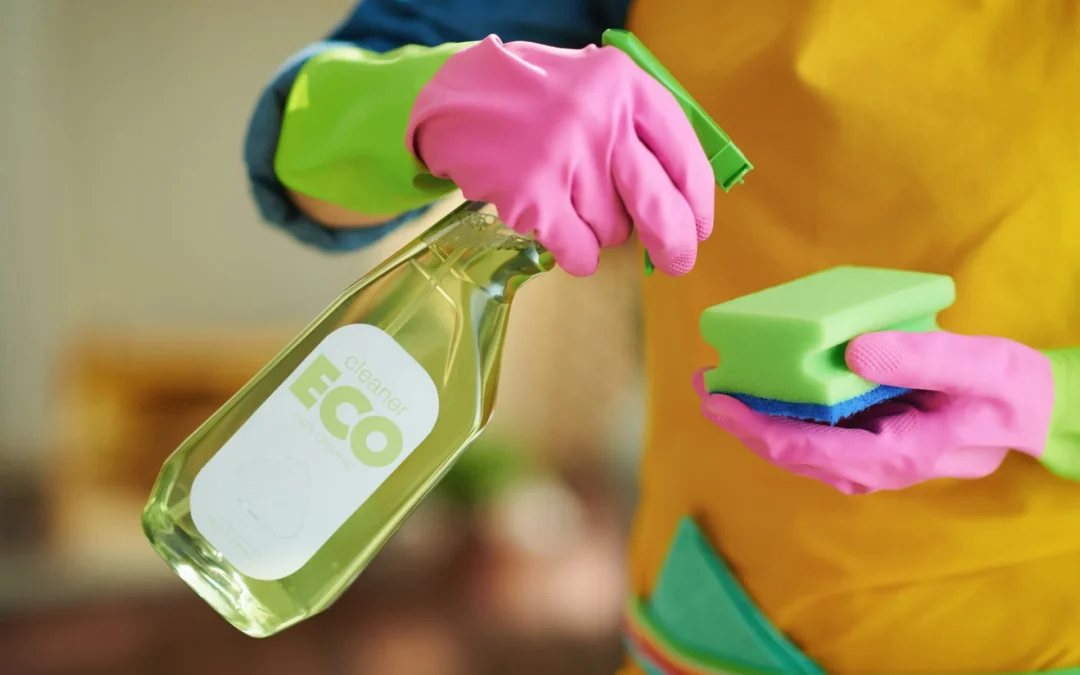In an era of increasing environmental consciousness, eco-friendly cleaning is no longer just an option—it’s a responsibility. The demand for sustainable cleaning products has surged, driven by growing awareness of the harmful effects that conventional cleaning agents can have on our health and the environment. This comprehensive guide explores the multifaceted benefits of eco-friendly cleaning and offers practical advice on selecting the best sustainable products for your home or office.

Eco-Friendly Cleaning
Why Choose Eco-Friendly Cleaning?
Eco-friendly cleaning products are formulated to minimize environmental impact. Unlike conventional cleaners, which often contain harsh chemicals such as bleach, ammonia, and phosphates, green cleaning products use biodegradable ingredients that break down naturally without harming ecosystems. These products are typically free from toxic substances, reducing indoor air pollution and minimizing health risks such as allergies, asthma, and skin irritations.
Another critical reason to choose eco-friendly cleaning solutions is the reduction of plastic waste. Many sustainable brands prioritize recyclable or compostable packaging and even offer refill options to minimize plastic consumption. By choosing eco-friendly products, you’re contributing to a circular economy and helping to reduce the global plastic footprint.
The Health Benefits of Green Cleaning
Switching to eco-friendly cleaning products can significantly impact your health and well-being. Traditional cleaning agents can release volatile organic compounds (VOCs), which are linked to various health problems, including respiratory issues, headaches, and even more severe conditions like chronic bronchitis and cancer. In contrast, green cleaning products are made from natural, non-toxic ingredients like vinegar, baking soda, and essential oils, which are safe for humans and pets.
Moreover, sustainable cleaning practices can help reduce the buildup of chemical residues on surfaces, improving the quality of the indoor environment. This is particularly important for households with children, elderly people, or anyone with compromised immune systems, who are more susceptible to the adverse effects of chemical exposure.
How to Identify Truly Eco-Friendly Products
With the rise in demand for green cleaning products, many brands are making eco-friendly claims. However, not all products labeled as “green” or “natural” are genuinely sustainable. To ensure you’re making a responsible choice, look for certifications from reputable organizations such as Green Seal, EcoLogo, or the EPA’s Safer Choice. These certifications indicate that a product meets stringent environmental and health standards.
Additionally, be mindful of ingredient lists. Avoid products containing phosphates, phthalates, chlorine, artificial fragrances, and dyes. Instead, opt for cleaners with simple, recognizable ingredients. Many brands also provide transparency about their formulations and manufacturing processes, which is a good indicator of a genuinely sustainable product.
Practical Tips for Green Cleaning
Adopting eco-friendly cleaning practices goes beyond just choosing the right products. Here are some tips to make your cleaning routine more sustainable:
- Use Reusable Cleaning Tools: Replace disposable wipes and paper towels with reusable microfiber cloths, which are not only effective at trapping dirt and bacteria but also reduce waste.
- Make Your Own Cleaning Solutions: Many effective cleaning solutions can be made from everyday household ingredients. For instance, a mixture of vinegar and water can clean glass surfaces, while baking soda is excellent for scrubbing and deodorizing.
- Implement a Cleaning Schedule: Regular maintenance reduces the need for deep cleaning and harsh chemicals. A routine schedule helps keep your home or office in a state of cleanliness that can be maintained with mild, eco-friendly products.
- Concentrate on High-Touch Areas: Focus on frequently touched surfaces like doorknobs, light switches, and countertops. Regularly disinfecting these areas with natural disinfectants like tea tree oil can prevent the spread of germs without resorting to harsh chemicals.
- Conserve Water and Energy: Use cold water for most cleaning tasks to save energy. Also, be mindful of water usage when cleaning; a bucket and cloth can often replace running water over a surface, reducing waste.
The Environmental Impact of Traditional Cleaning Products
Conventional cleaning products can have a profound negative impact on the environment. Many contain harmful chemicals that can end up in waterways, affecting aquatic life and polluting water sources. Additionally, the production and disposal of plastic packaging contribute significantly to environmental degradation.
By switching to eco-friendly products, you help reduce this impact. Biodegradable ingredients break down naturally, reducing their footprint. Moreover, many sustainable cleaning companies focus on ethical sourcing and cruelty-free practices, further promoting environmental and social responsibility.
Cost-Effectiveness of Eco-Friendly Cleaning
There is a common misconception that eco-friendly products are more expensive than their conventional counterparts. While some green cleaning products may have a higher upfront cost, they are often more concentrated, meaning a small amount goes a long way. Additionally, making your own cleaning solutions from inexpensive household ingredients can further reduce costs.
Moreover, the long-term benefits of using eco-friendly products—such as extending the lifespan of household items, reducing healthcare costs by avoiding toxic exposures, and even contributing to a more sustainable planet—far outweigh the initial investment.
Conclusion
Transitioning to eco-friendly cleaning practices is a simple yet powerful way to protect your health and the environment. By understanding the benefits and knowing how to choose genuinely sustainable products, you can make informed decisions that contribute to a cleaner, greener future. Start today by replacing your conventional cleaners with eco-friendly alternatives, and embrace a healthier, more sustainable lifestyle.


Recent Comments